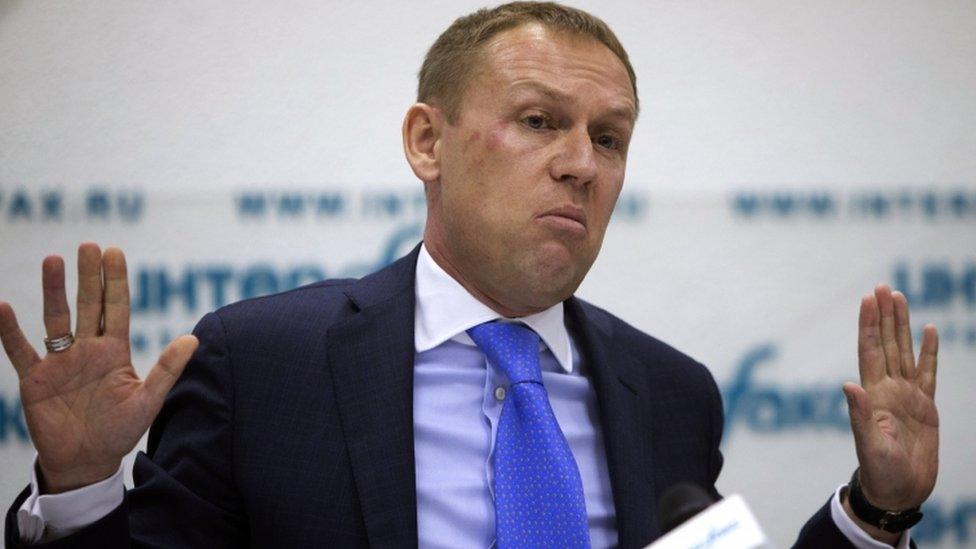Litvinenko suspects Andrei Lugovoi and Dmitry Kovtun
- Published
The chairman of the UK public inquiry into the death of Alexander Litvinenko has said he is sure that it was Andrei Lugovoi and Dmitry Kovtun who poisoned the former Russian spy.
Judge Robert Owen said they had placed polonium-210 in a teapot at a meeting in the Pine Bar in London on 1 November 2006. Mr Litvinenko, 43, died days later.
Mr Lugovoi and Mr Kovtun have long been named by British police as prime suspects but attempts to extradite them from Russia have failed. Both deny involvement.
Andrei Lugovoi

Mr Lugovoi said the accusations against him were "absurd"
Born in Baku, Azerbaijan in 1966, a childhood friend of Dmitry Kovtun. The pair both joined the KGB in the late 1980s.
In the first half of the 1990s his duties included providing personal security for top officials.
He later went into the private security business. He served as head of security at Russian TV channel ORT and knew Mr Litvinenko for 10 years before the latter left Russia. Mr Lugovoi said this was just an acquaintance and he had neither personal nor business contacts.
Mr Lugovoi said the pair had no communication at all after Mr Litvinenko went to the UK until an "unexpected" call from the latter arranged the meeting in November 2006 in London.
In an interview with Russian radio station Ekho Moskvy, Mr Lugovoi insisted: "I can assure you with 100% certainty that he didn't order anything and we didn't offer anything to him either."
Traces of polonium-210 were found in hotels, dining rooms and aircraft used by Mr Lugovoi in 2006. He himself was treated in Moscow in December 2006 for radiation poisoning.
After Mr Litvinenko's death, Russia's ultra-nationalist Liberal Democratic Party invited Mr Lugovoi on to the 2007 candidate list for election to the federal parliament, the Duma. As an MP he has parliamentary immunity.
The BBC's Daniel Sandford travelled to Russia's Kamchatka peninsula to speak to Andrei Lugovoi
In March 2015, President Vladimir Putin showed his support for Mr Lugovoi by awarding him a medal for "services to the motherland".
Responding to the inquiry, Mr Lugovoi said the accusations against him were "absurd".
"As we expected, there were no surprises," he said.
"The results of the investigation... yet again confirm London's anti-Russian position, its blinkeredness and the unwillingness of the English to establish the true reason of Litvinenko's death."
Dmitry Kovtun
Dmitry Kovtun speaking to the BBC's Richard Galpin in March 2015
Dmitry Kovtun was born in 1965 and trained with Mr Lugovoi at the Soviet command academy in Moscow before joining him in the protection unit of the KGB.
He was serving in East Germany as the Soviet Union collapsed and fled with his first wife to Hamburg to claim political asylum.
Mr Kovtun took various jobs including as a waiter and dishwasher. His then wife said he wanted to be a porn star and had a drink problem, the inquiry heard.
Mr Kovtun returned to Russia, where he was allegedly recruited by Mr Lugovoi.
Mr Kovtun said he was involved in the oil and gas industry and these "credentials" were used to help gain a visa for his visit to Britain in 2006.
His first wife cast doubt on whether Mr Kovtun's claims of involvement in the industries were true.
The inquiry heard he had told a close friend he was carrying "a very expensive poison" shortly before the Litvinenko meeting.
Now a businessman in Moscow, Mr Kovtun last year made overtures to help the British inquiry.
However, he failed to appear on a video link, saying later he had not obtained permission from the Russian authorities to give evidence.
After the UK report was released, Mr Kovtun told Interfax: "I am not involved in Litvinenko's death. As for the outcome of the public inquiry that has been published in London, Robert Owen could not have reached any other conclusions based on the falsified and fabricated evidence."